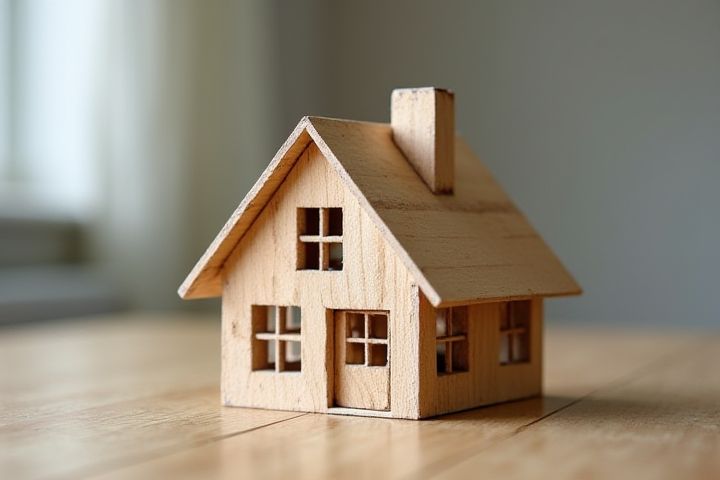
To secure house renovation loans, explore options from traditional banks, credit unions, and online lenders specializing in home improvement financing. Government-backed programs such as the Federal Housing Administration (FHA) 203(k) loan allow you to finance both home purchase and renovation costs in a single mortgage. Home equity loans or home equity lines of credit (HELOCs) offer another route by leveraging your home's equity for renovation expenses. Research local community banks as they often have tailored renovation loan programs with competitive rates. You can also consider peer-to-peer lending platforms, which might provide flexible terms and quicker access to funds for your remodeling project.
Where To Get House Renovation Loans
Personal Loan
You can obtain house renovation loans in the form of personal loans from various financial institutions, including banks, credit unions, and online lenders. Many banks offer specialized personal loan options tailored for home improvements, allowing you to borrow a set amount with favorable interest rates and repayment terms. Online lenders often provide a faster application process and competitive rates, enabling you to access the funds quickly for renovation projects. When considering personal loans for renovations, ensure you compare different lenders and their terms to find the best match for your financial situation.
Home Equity Loan
To obtain a home equity loan for your house renovation project, start by evaluating your current mortgage lender, as they may offer competitive rates and streamlined application processes. Local credit unions often provide favorable terms, so checking with them can yield beneficial options tailored to your financial situation. Additionally, consider online lenders that specialize in home equity products, as they may offer flexibility in borrowing limits and quick funding timelines. Before applying, ensure you have a clear estimate of your renovation costs and understand the implications of borrowing against your home equity.
Home Equity Line of Credit (HELOC)
To secure a house renovation loan, consider obtaining a Home Equity Line of Credit (HELOC), which allows you to borrow against the equity in your home. Local banks and credit unions typically offer HELOCs, providing competitive interest rates and flexible borrowing limits. Online lenders also present options for HELOCs, often with streamlined application processes and quick funding. Before committing, evaluate terms, fees, and repayment options to ensure that the HELOC aligns with your renovation budget and financial strategy.
Cash-Out Refinance
Cash-out refinance is a popular option for homeowners seeking house renovation loans. This financial strategy allows you to refinance your existing mortgage for more than you currently owe and withdraw the difference in cash, which can be used for renovations or improvements. Leading lenders, including banks and credit unions, often offer competitive rates for cash-out refinancing, making it easier for you to access funds. It's crucial to compare interest rates, terms, and fees from multiple financial institutions to find the best fit for your renovation project.
FHA 203(k) Loan
FHA 203(k) loans, a popular choice for home renovation financing, are designed specifically for homeowners aiming to improve or repair their properties. You can obtain this loan through approved lenders like banks or credit unions that participate in the FHA program. The process involves a thorough application where you'll need to provide detailed renovation plans and cost estimates. Additionally, understanding the eligibility requirements, including credit score and debt-to-income ratios, will help you secure the funding needed for your project.
Credit Union Loan
Credit unions offer attractive options for house renovation loans, providing competitive interest rates and personalized service. You can find a suitable credit union in your area by searching online directories or visiting websites like the National Credit Union Administration (NCUA). Many credit unions also offer flexible repayment terms and lower fees compared to traditional banks, enhancing affordability for your renovation projects. Joining a credit union may require a membership eligibility, often based on your location, employment, or community affiliation, making it an accessible choice for many homeowners.
Contractor Financing
To secure house renovation loans with an emphasis on contractor financing, consider local banks or credit unions that offer specialized loan products tailored for home improvements. Online lenders are increasingly providing flexible options that allow you to compare rates and terms conveniently. Explore government-backed programs, such as the FHA 203(k) loan, which can include financing for contractors within the overall mortgage. Consulting with licensed contractors can also yield referrals to financing partners that streamline the process for your renovation projects.
Peer-to-Peer Lending
Peer-to-peer lending platforms like LendingClub and Prosper provide excellent options for securing house renovation loans. These platforms connect borrowers directly with individual investors, often resulting in lower interest rates compared to traditional banks. You'll need to present your renovation plan and financial profile to attract potential lenders, emphasizing the value of your home post-renovation. Before committing, compare the terms, interest rates, and repayment plans across different platforms to find the best fit for your renovation needs.
Government Grants
To obtain house renovation loans, consider exploring government grants aimed at home improvement projects. Programs like the U.S. Department of Housing and Urban Development (HUD) offer grants through initiatives such as the Home Improvements Program, specifically designed for low-income homeowners. Local state and municipal government websites frequently list available grants, often requiring an application process showcasing your renovation plans. You can also consult organizations such as the Federal Housing Administration (FHA), which may provide additional funding options or financial assistance tailored to enhancing your home's livability and energy efficiency.
Energy Efficient Mortgage (EEM)
Energy Efficient Mortgages (EEM) can be obtained through various lenders, including banks, credit unions, and mortgage companies. These loans allow you to finance energy-efficient upgrades alongside your home purchase or refinance, with up to 15% of the property's value available for improvements. You can also explore government-backed programs like FHA EEMs, which support energy-efficient renovations with lower down payments and reduced closing costs. To access these loans, research local lenders who offer EEM options and gather necessary documents like income verification and renovation estimates.
